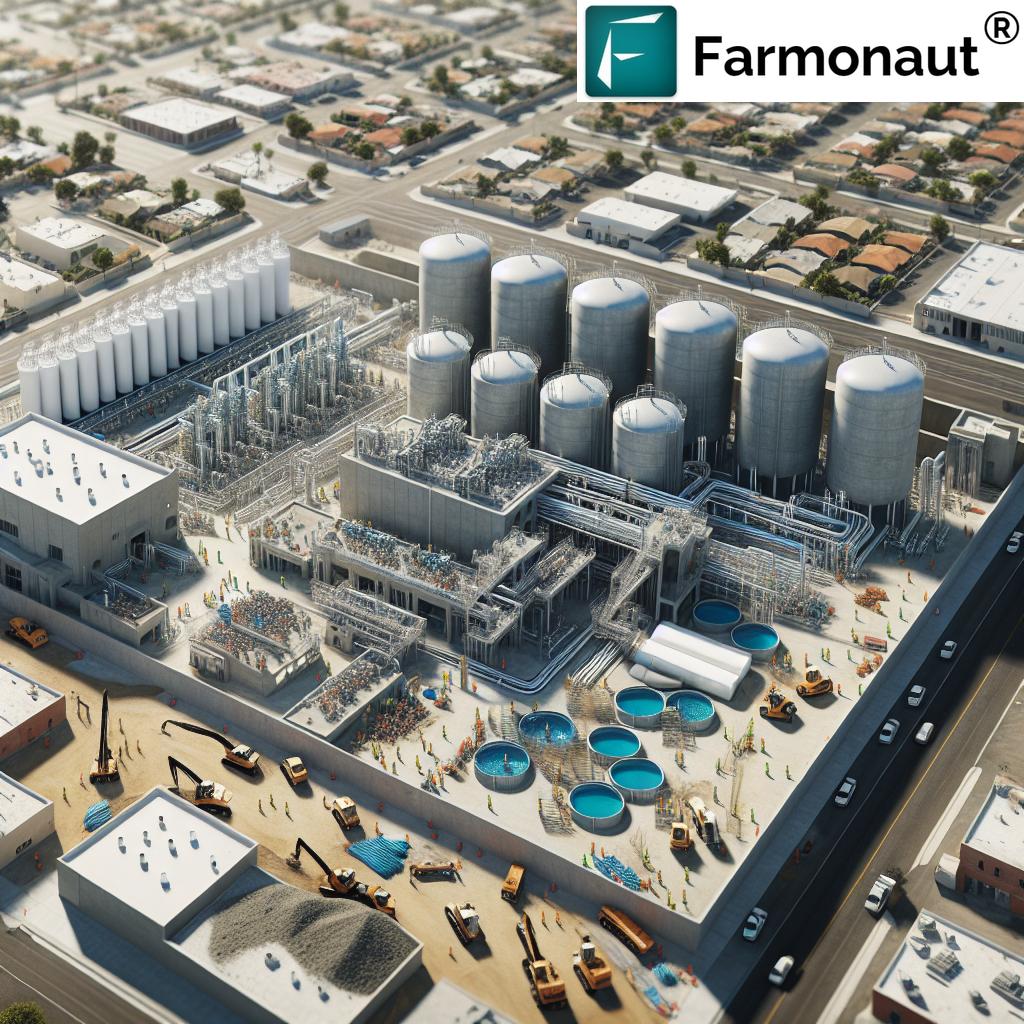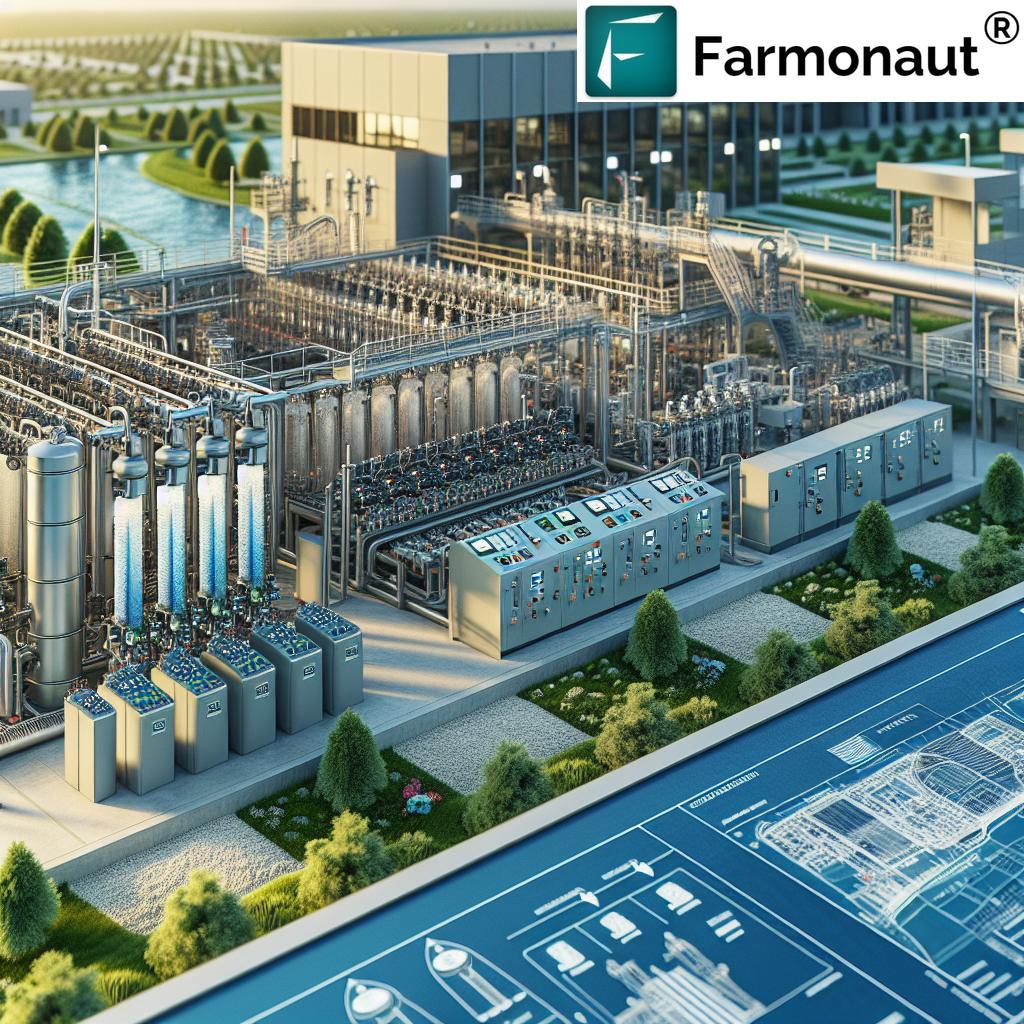Wellington’s $93 Million Water Infrastructure Upgrade: Boosting Capacity for Sustainable Growth in Colorado
“Wellington’s $93 million water infrastructure upgrade doubled the town’s utility services capacity to 6 million gallons per day.”
In a significant move towards sustainable urban growth planning, the Town of Wellington, Colorado, has successfully completed a monumental $93 million water infrastructure upgrade. This comprehensive project, encompassing both the water treatment plant expansion and water reclamation facility projects, marks a pivotal moment in the town’s development strategy. As we delve into the intricacies of this transformative initiative, we’ll explore how these utility infrastructure improvements are set to shape Wellington’s future and serve as a model for other municipalities facing similar growth challenges.
The Need for Expansion: Addressing Growth and Regulatory Requirements
Wellington, like many growing communities in Colorado, has been experiencing rapid population and commercial growth. This expansion has put increasing pressure on the town’s existing water and sewer services. Recognizing the urgent need to address these challenges, town officials embarked on an ambitious plan to double the capacity of their utility services. This foresight not only accommodates current needs but also prepares Wellington for future development.
The water treatment plant expansion and water reclamation facility projects were not just about increasing capacity. They were also designed to meet stringent regulatory requirements, ensuring that Wellington’s water management practices align with the highest environmental standards. This dual focus on capacity and quality underscores the town’s commitment to responsible growth and environmental stewardship.

Breaking Down the $93 Million Investment
The total investment of nearly $93 million was strategically divided between two critical components of Wellington’s water infrastructure:
- Water Treatment Plant Expansion: $39,055,590
- Water Reclamation Facility Project: $53,109,734
This substantial investment reflects the town’s dedication to long-term sustainability and its recognition of water as a crucial resource for community development. Let’s explore how this funding was secured and allocated to ensure the project’s success.
Funding Sources: A Model of Financial Planning
Securing funding for such a large-scale municipal water capacity increase project required careful financial planning and leveraging of various resources. Wellington’s approach to funding these expansions serves as an exemplary model for other municipalities facing similar infrastructure challenges. The primary sources of funding included:
- Colorado’s State Revolving Fund: This program provided low-interest loans specifically designed for essential water infrastructure projects. By utilizing this fund, Wellington was able to access the necessary capital while minimizing the long-term financial burden on its residents.
- Water Enterprise Fund: Wellington’s forward-thinking financial management allowed it to contribute significantly from its own Water Enterprise Fund, demonstrating fiscal responsibility and self-reliance.
- Town Reserves: Additional funding was drawn from the town’s reserves, highlighting the importance of maintaining robust financial reserves for critical infrastructure projects.
This diverse funding approach not only made the project financially feasible but also distributed the cost burden responsibly, ensuring the long-term financial health of the community.
Project Execution: On Time and Under Budget
One of the most impressive aspects of Wellington’s water infrastructure upgrade was its execution. Both the water treatment plant expansion and the water reclamation facility projects were completed on schedule and, remarkably, under budget. This achievement is a testament to the effective project management and the dedication of all parties involved.
Key factors contributing to this success included:
- Careful planning and design phases that anticipated potential challenges
- Selection of experienced contractors with proven track records in public works engineering projects
- Close collaboration between town officials, engineers, and construction teams
- Regular monitoring and adjustment of project timelines and budgets
The ability to complete such complex projects within budget constraints is particularly noteworthy in an era where infrastructure projects often face cost overruns and delays. Wellington’s success in this regard sets a new standard for municipal water and sewer services expansion initiatives.
Technical Marvels: Inside the Expansions
The water treatment plant expansion and water reclamation facility projects were not just about increasing capacity; they also incorporated cutting-edge technologies and design features to enhance efficiency and sustainability. Let’s take a closer look at the technical aspects of these expansions:
Water Treatment Plant Expansion
The expansion of the water treatment plant was a monumental undertaking, increasing its capacity from 2 million to 4.2 million gallons per day. This significant boost in capacity required:
- Installation of 6,500 linear feet of buried pipe
- 2,500 feet of interior pipe
- 680,000 pounds of rebar
- 4,000 cubic yards of concrete
- A total of 157,945 man-hours of labor
The expanded plant incorporates advanced filtration systems and automated monitoring technologies, ensuring the highest quality of water treatment while optimizing operational efficiency.
Water Reclamation Facility Project
The water reclamation facility saw an even more dramatic increase in capacity, doubling from 900,000 to 1.8 million gallons per day. This expansion involved:
- Installation of 11,100 linear feet of buried pipe
- 4,220 feet of interior pipe
- 1,316,640 pounds of rebar
- 7,700 cubic yards of concrete
- A total of 185,370 man-hours of labor
The upgraded facility features state-of-the-art wastewater management technologies, including enhanced nutrient removal systems and energy-efficient processing methods. These improvements not only increase capacity but also significantly improve the quality of treated water released back into the environment.
“The expanded water treatment plant in Wellington, Colorado now processes 4.2 million gallons daily, supporting sustainable urban growth.”
Environmental Impact and Sustainability
Wellington’s commitment to environmental stewardship is evident in the design and implementation of these water infrastructure upgrades. The projects incorporate several key features aimed at minimizing environmental impact and promoting sustainability:
- Energy Efficiency: Both facilities utilize energy-efficient equipment and processes, reducing the overall carbon footprint of water treatment operations.
- Water Conservation: Advanced technologies in the water reclamation facility allow for increased water reuse, reducing the strain on freshwater resources.
- Stormwater Management: The upgrades include improvements to stormwater infrastructure, helping to prevent flooding and reduce pollutant runoff into local waterways.
- Future-Proofing: The design of both facilities allows for future expansions, ensuring that Wellington can continue to grow sustainably without the need for frequent, disruptive construction projects.
These environmental considerations not only benefit the local ecosystem but also position Wellington as a leader in sustainable urban water management practices.

Economic Implications: Supporting Growth and Development
The $93 million investment in Wellington’s water infrastructure is more than just a utility upgrade; it’s a catalyst for economic growth and development. By dramatically increasing the town’s capacity to provide water and sewer services, Wellington has effectively removed a significant barrier to growth. This expansion opens up new possibilities for:
- Residential Development: The increased capacity allows for the construction of new housing developments, helping to meet the growing demand for homes in the area.
- Commercial Expansion: Businesses requiring substantial water resources can now consider Wellington as a viable location, potentially bringing new jobs and economic opportunities to the town.
- Industrial Growth: The enhanced water and wastewater management capabilities make Wellington an attractive option for industries that rely heavily on water resources.
- Agricultural Support: Improved water management can benefit local agriculture, ensuring a stable water supply for irrigation and other farming needs.
Moreover, the successful completion of these projects demonstrates Wellington’s commitment to infrastructure investment, which can attract further development and investment in the region.
Comparative Analysis: Wellington’s Water Infrastructure Upgrade
| Project Component | Previous Capacity | New Capacity | Investment |
|---|---|---|---|
| Water Treatment Plant | 2 million gallons/day | 4.2 million gallons/day | $39,055,590 |
| Water Reclamation Facility | 900,000 gallons/day | 1.8 million gallons/day | $53,109,734 |
| Total Capacity Increase | 2.9 million gallons/day | 6 million gallons/day | $92,165,324 |
| Key Technologies Implemented | |||
| Advanced Filtration Systems | Nutrient Removal Technologies | ||
| Automated Monitoring Systems | Energy-Efficient Processing | ||
| Environmental Impact | |||
| Improved Water Quality | Reduced Carbon Footprint | ||
| Enhanced Stormwater Management | Increased Water Reuse Capabilities | ||
| Future Expansion Potential | |||
| Both facilities designed for future capacity increases without major reconstruction | |||
Lessons Learned: A Model for Other Municipalities
Wellington’s successful execution of this massive water infrastructure upgrade offers valuable lessons for other municipalities facing similar challenges:
- Proactive Planning: By anticipating future growth needs, Wellington was able to implement a solution that addresses both current and future demands.
- Innovative Financing: The use of diverse funding sources, including state revolving funds and enterprise funds, demonstrates creative approaches to financing large-scale projects.
- Stakeholder Collaboration: The close collaboration between town officials, engineers, and contractors was crucial to the project’s success.
- Environmental Integration: Incorporating sustainability features into the design ensures long-term environmental benefits alongside capacity increases.
- Efficient Project Management: Completing the projects on time and under budget showcases the importance of effective project management in public works.
These lessons can serve as a blueprint for other towns and cities looking to upgrade their water infrastructure in a sustainable and cost-effective manner.
The Role of Technology in Modern Water Infrastructure
Wellington’s water infrastructure upgrade showcases the critical role of technology in modern water management systems. Advanced technologies employed in these projects include:
- Smart Monitoring Systems: Real-time data collection and analysis for efficient operation and maintenance.
- Advanced Filtration Technologies: Ensuring higher water quality with reduced chemical usage.
- Energy Recovery Systems: Minimizing energy consumption and operational costs.
- Automated Control Systems: Optimizing plant operations for maximum efficiency.
These technological advancements not only improve the efficiency and effectiveness of water treatment and reclamation but also contribute to the overall sustainability of the system. By leveraging these technologies, Wellington has positioned itself at the forefront of modern water infrastructure management.
Community Impact and Public Reception
The completion of Wellington’s water infrastructure upgrade has had a significant impact on the local community. Some key aspects include:
- Improved Water Quality: Residents now enjoy higher quality water for everyday use.
- Increased Property Values: Enhanced infrastructure can lead to increased property values throughout the town.
- Economic Growth Potential: The expanded capacity opens doors for new businesses and developments.
- Environmental Benefits: Improved wastewater treatment reduces the town’s environmental footprint.
Public reception to the project has been overwhelmingly positive, with many residents recognizing the long-term benefits of this investment in their community’s future.
Future Outlook: Wellington’s Path Forward
With the successful completion of this $93 million water infrastructure upgrade, Wellington is well-positioned for future growth and development. The town’s forward-thinking approach to water management sets a solid foundation for:
- Sustainable population growth
- Attraction of new businesses and industries
- Enhanced environmental stewardship
- Improved quality of life for residents
As Wellington continues to grow and evolve, the investments made in water and sewer services will play a crucial role in shaping the town’s future. The expanded capacity and improved technologies provide a robust framework for sustainable urban development for years to come.
Conclusion: A Milestone in Sustainable Urban Development
Wellington’s $93 million water infrastructure upgrade stands as a testament to the power of visionary planning, strategic investment, and community commitment. By doubling its utility services capacity and implementing state-of-the-art technologies, Wellington has not only addressed its immediate needs but has also laid a solid foundation for sustainable future growth.
This project serves as an inspirational model for other municipalities facing similar challenges in water management and urban development. It demonstrates that with careful planning, innovative financing, and a commitment to sustainability, it’s possible to achieve significant infrastructure improvements that benefit both current and future generations.
As we look to the future, Wellington’s success story in water infrastructure management will undoubtedly continue to inspire and guide other communities in their pursuit of sustainable, resilient, and forward-thinking urban development strategies.
FAQs
- Q: How long did the water infrastructure upgrade project take to complete?
A: The projects began in spring 2022 and were completed on schedule, with the final touches on the reclamation facility expected by June 13. - Q: What was the total cost of the water infrastructure upgrade in Wellington?
A: The total investment for both the water treatment plant expansion and water reclamation facility project was nearly $93 million. - Q: How much did the water treatment plant’s capacity increase?
A: The water treatment plant’s capacity increased from 2 million to 4.2 million gallons per day. - Q: What was the capacity increase for the water reclamation facility?
A: The water reclamation facility’s capacity doubled from 900,000 to 1.8 million gallons per day. - Q: How was the project funded?
A: The project was funded through a combination of loans from Colorado’s State Revolving Fund and resources from the town’s Water Enterprise Fund and reserves. - Q: Were the projects completed within budget?
A: Yes, both the water treatment and reclamation facilities were completed on schedule and under budget. - Q: What environmental benefits does this upgrade provide?
A: The upgrade includes improved wastewater management, enhanced stormwater infrastructure, and more efficient water treatment processes, all contributing to better environmental stewardship. - Q: How does this upgrade support Wellington’s future growth?
A: The increased capacity allows Wellington to accommodate population growth, attract new businesses, and support future development while ensuring consistent water and sewer services. - Q: Were any new technologies implemented in these upgrades?
A: Yes, the upgrades incorporated advanced filtration systems, automated monitoring technologies, and energy-efficient processing methods. - Q: How will this upgrade affect Wellington residents?
A: Residents can expect improved water quality, more reliable water and sewer services, and the potential for increased property values and economic opportunities in the town.
Earn With Farmonaut: Affiliate Program
Earn 20% recurring commission with Farmonaut’s affiliate program by sharing your promo code and helping farmers save 10%. Onboard 10 Elite farmers monthly to earn a minimum of $148,000 annually—start now and grow your income!
For more information on advanced agricultural technologies and satellite-based farm management solutions, visit Farmonaut.
Explore our services:
Download our mobile apps:












